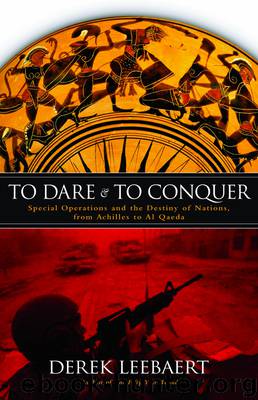To Dare and to Conquer by Leebaert Derek

Author:Leebaert, Derek [LEEBAERT, DEREK]
Language: eng
Format: epub
ISBN: 9780316075459
Publisher: Little, Brown and Company
Published: 2009-05-29T16:00:00+00:00
IN ONE theater of European warfare, however, we do encounter the full possibilities of small-force initiative of that epoch: Giuseppe Garibaldi’s liberation of the Mezzogiorno, that part of southern Italy somewhere between the first and third worlds of the time. Significantly, Garibaldi was a leader seasoned in the hypermobile small wars of South America’s Rio de la Plata basin, where he learned to live rough and fight dirty. He left Montevideo in 1848 with sixty-three men, intending to start a revolution.
In the mid-nineteenth century, the Bourbons (part of a junior dynastic complex of that family which long ruled France, and are back to being kings of Spain) lorded it over southern Italy, as the “Kingdom of the Two Sicilies,” from their seat in Naples, the third-largest city in Europe. Garibaldi proposed to expel them and unite the nation. But timing was not yet right. Liking to fight against impossible odds, he was dismissed as a “buccaneer” by the Italian authorities he wished to serve. 24 Years were spent on the run, seeking work in the United States, before returning to Italy to await the main chance.
By the night of May 5, 1860, a “picked body of seamen” carrying pistols clambered up from rowboats to hijack two paddle-wheeled steamers in Genoa’s harbor. 25 Nearly 1,150 would-be fighting men (“The Thousand,” and one woman) then boarded the steamers from small boats at sea. These volunteers were of all sorts: “a hundred doctors and a hundred and fifty lawyers . . . students, journalists, gentlemen adventurers, labourers, tramps and artists.” 26 It was an eccentric mix of determined people for extraordinary ends of a sort we have seen before, and for whom Colonel Colt would supply revolvers.
Two days later, and barely missing two Neapolitan warships, they landed at undefended Marsala on the island of Sicily’s west coast. Garibaldi stated his hope of starting an avalanche, tiny successes to roll into greater ones. He seized the electric telegraph office, sent off false messages, rallied peasants and clergy, and led his poorly armed irregulars through torturous hill-country paths northeast toward the Bourbon garrison of twenty thousand soldiers in Palermo. “Skillful diversions and clever use of mock campfires,” plus the deadly silencing of sentries, caught the soldiers off guard. 27 It was all a ludicrously impossible assault. Yet he leveraged speed and the enemy’s certainty that nothing like it could be pulled off to transform his effort into supremely effective sustained combat: he swept the island to face an overwhelming superior enemy across the Strait of Messina. Then he won Naples. The impossible could indeed be accomplished by resolute spirit, for starters. Shock at his astounding military achievement had its political effect; the army of Victor Emmanuel (monarch of a modest realm in the northwest and of Sardinia) moved down to cut through the turmoil and to unify most of the peninsula into what was to be the new Kingdom of Italy, the sixth power in Europe.
By this time, the high commands of the industrializing nations
Download
This site does not store any files on its server. We only index and link to content provided by other sites. Please contact the content providers to delete copyright contents if any and email us, we'll remove relevant links or contents immediately.
| Automotive | Engineering |
| Transportation |
Whiskies Galore by Ian Buxton(41986)
Introduction to Aircraft Design (Cambridge Aerospace Series) by John P. Fielding(33115)
Small Unmanned Fixed-wing Aircraft Design by Andrew J. Keane Andras Sobester James P. Scanlan & András Sóbester & James P. Scanlan(32788)
Craft Beer for the Homebrewer by Michael Agnew(18234)
Turbulence by E. J. Noyes(8040)
The Complete Stick Figure Physics Tutorials by Allen Sarah(7362)
The Thirst by Nesbo Jo(6930)
Kaplan MCAT General Chemistry Review by Kaplan(6926)
Bad Blood by John Carreyrou(6610)
Modelling of Convective Heat and Mass Transfer in Rotating Flows by Igor V. Shevchuk(6432)
Learning SQL by Alan Beaulieu(6277)
Weapons of Math Destruction by Cathy O'Neil(6264)
Man-made Catastrophes and Risk Information Concealment by Dmitry Chernov & Didier Sornette(6002)
Digital Minimalism by Cal Newport;(5747)
Life 3.0: Being Human in the Age of Artificial Intelligence by Tegmark Max(5545)
iGen by Jean M. Twenge(5408)
Secrets of Antigravity Propulsion: Tesla, UFOs, and Classified Aerospace Technology by Ph.D. Paul A. Laviolette(5364)
Design of Trajectory Optimization Approach for Space Maneuver Vehicle Skip Entry Problems by Runqi Chai & Al Savvaris & Antonios Tsourdos & Senchun Chai(5063)
Pale Blue Dot by Carl Sagan(4996)
